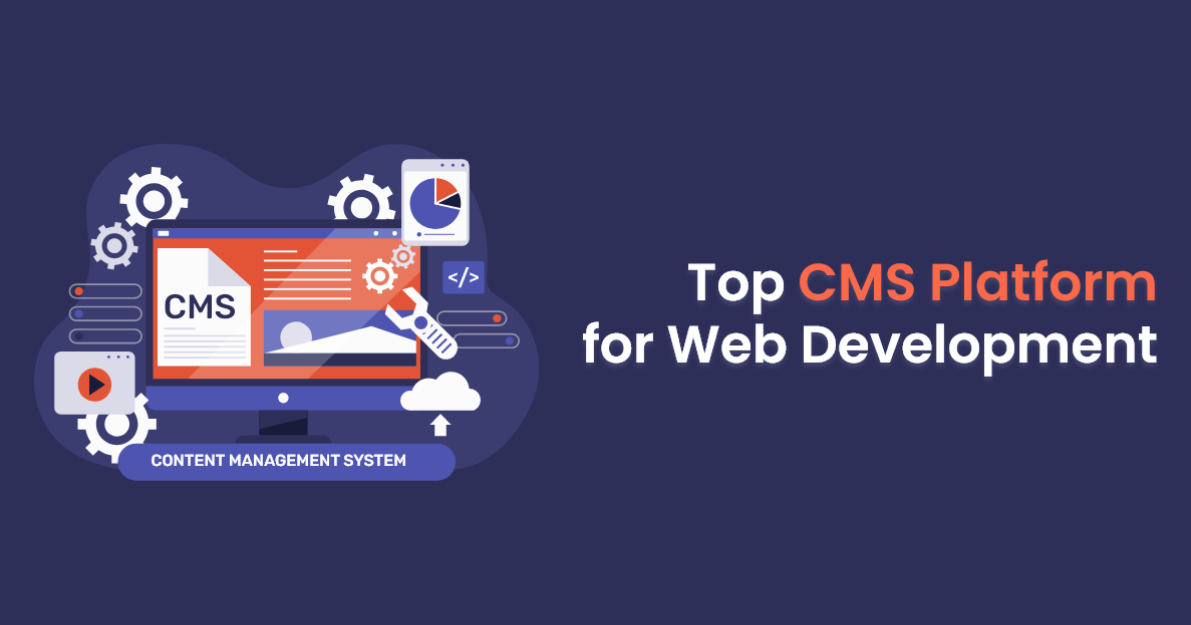10 Best CMS Platforms to Help You Build a Better Website
Do you want to build a user-friendly website that looks great but is also easy to manage? Then you need to choose a content management system (CMS) that meets your needs.
As per the latest survey report published by W3Techs, almost 60% of all websites are powered by content management systems. Plenty of content management systems are available, but not all are created equal. So it cannot be easy to know which one is right for you.
But before diving into the list, ask yourself these three questions, what is CMS, why CMS, and how many types of content management systems are there? It will give you a brief understanding of content management systems and help you choose the best platform for your website.
So, read on to know the answer to these questions, plus the top CMS platforms that you can use to build your website. Now, let’s get started!
What is a content management system (CMS)?
A CMS is a software application that helps you create, edit, and publish content. It also allows you to manage your website without code or hire a web developer.
A CMS makes it easy to create and update your website, so you can concentrate on preparing great content instead of worrying about the technical aspects of your site.
Why use a CMS?
Businesses need to have a solid online presence to stay competitive. The market is now more digital than ever before. A CMS can help you create and maintain a professional website without hiring a web developer.
There are many other benefits of using a CMS, such as:
- You can create and edit content without knowing HTML or CSS.
- A CMS can help you manage your website more efficiently.
- A CMS can make it easy to add new features to your website without hiring a developer.
- A CMS can help you create a great responsive website on all devices.
How many types of content management systems are there?
There are mainly four main types of content management systems:
- E-commerce CMS- An e-commerce CMS is a platform that helps you build an online store. Shopify and Magento are two popular e-commerce CMS platforms.
- SaaS CMS- It is a type of CMS hosted by the provider. The most popular SaaS CMS platform is WordPress.com.
- Open-source CMS- An open-source content management system anyone can download and use for free. Drupal and Joomla are two popular open-source CMS platforms.
- Headless CMS- It does not have a front-end type of CMS. You can use any platform to build your front-end and any device to access your content. Contentful and Strapi are two popular headless CMS platforms.
What are the top CMS platforms?
Now that you know the answer to the question, what is a CMS, it’s time to look at the top 10 content management system platforms that you can use to build your website.
-
WordPress
WordPress is the most popular CMS platform available today worldwide. It powers over 35% of all websites on the internet. The platform is free to use and open-source. It is simple to use and has a large community of developers who create themes and plugins.
Additionally, WordPress is a versatile platform that can be used for any website, from a simple blog to a complex e-commerce store.
Top Benefits of WordPress:
- Available free of cost
- Very user-friendly and easy to use
- Supports a large number of themes and plugins
- Adding website content is easy with WordPress
- Updates are easy to install
- Hosting is cheap and easy to find
-
Joomla
Joomla is an open-source CMS platform used by millions of people worldwide. It is quite easy to use and has a large community of developers who create themes and plugins.
Many features make Joomla an excellent platform for building websites. It has a built-in commenting system, RSS feeds, and support for multiple languages.
Top Benefits of Joomla:
- A flexible system, simple to extend and customize to your needs.
- Free forever Open Source software released under the GPL.
- Constantly improved and updated by a team of talented developers from all over the world.
- Grows organically to reflect the needs of its users.
-
Drupal
Drupal CMS platform is used by some of the biggest brands in the world, including Coca-Cola, Tesla, and The Economist. It is a robust platform that can be used to build any website.
This popular cm has many features that make it an excellent platform for building websites. It has a built-in commenting system, RSS feeds, and support for multiple languages.
Top Benefits of Drupal:
- An Enterprise CMS platform used by some of the biggest brands in the world.
- A robust platform that can be used to build any website.
- Has a built-in commenting system, RSS feeds, and support for multiple languages.
- Flexible and extensible with a wide range of modules and themes.
-
Shopify
Shopify is the leading e-commerce platform, and it powers over 1 million online stores. It is a hosted platform that makes it easy to build an online store. The platform has a shopping cart, inventory management, and order processing.
There is no need to install any new software or set up hosting. Shopify takes care of all of that for you. You just have to sign up for an account and build your store.
Top Benefits of Shopify:
- Quick & easy to set up & use.
- A built-in shopping cart, inventory management, and order processing.
- Hundreds of free plus paid themes to choose from.
- Can sell physical and digital goods both.
-
Wix
Wix is a famous website builder that can be used to create any website. It is a drag-and-drop platform that makes it easy to build a website without coding knowledge. Additionally, Wix has a built-in shopping cart, email marketing, and SEO tools.
Top Benefits of Wix:
- Attractive, well-designed templates.
- A drag-and-drop platform that makes it easy to build a website.
- A built-in shopping cart, email marketing, and SEO tools.
- Great extra features for e-commerce stores, such as abandoned cart recovery.
-
Weebly
Weebly website builder is a popular platform that can create any website. It is easy to use and has a drag-and-drop interface. Additionally, Weebly has a built-in shopping cart, email marketing, and SEO tools.
Additionally, Weebly offers a wide range of themes and plugins. Developing a website on Weebly is easy and does not require any coding knowledge.
Top Benefits of Weebly:
- A user-friendly platform that is easy to use.
- A drag-and-drop interface that makes it easy to build a website.
- A built-in shopping cart, email marketing, and SEO tools.
- Fully integrated website and online store with a unified checkout.
-
PrestaShop
PrestaShop is an open-source e-commerce platform that over 250,000 online stores use. It is a versatile platform that can sell physical and digital goods. Additionally, PrestaShop has a built-in shopping cart, inventory management, and order processing.
Among its many features, PrestaShop is one of the few e-commerce platforms that offer multi-store support. You can manage multiple online stores from a single PrestaShop installation.
Top Benefits of PrestaShop:
- Open source and free to download & use.
- Quick install features let you get started quickly.
- A built-in shopping cart, inventory management, and order processing.
- Flexible and easy-to-manage Back-end
- Multi-store support lets you manage multiple online stores from a single installation.
-
Magento
Magento is a popular e-commerce platform that over 250,000 online stores use. It is a versatile platform that can sell physical and digital goods. Magento – Community Edition (which is free to download and use) and Enterprise Edition (a paid version with additional features).
The platform has a shopping cart, inventory management, and order processing. Additionally, Magento offers a wide range of plugins and themes.
Top Benefits of Magento:
- Open source and free Community Edition are available.
- A built-in shopping cart, inventory management, and order processing.
- Flexible and scalable platform that can sell any product.
- A wide range of themes and plugins to choose from.
- The Enterprise Edition has extra features such as advanced search, customer segmentation, and Gift Cards.
-
Drupal
Drupal is a popular CMS used by over 1 million websites. It is a versatile platform that can create any website. Additionally, Drupal has a built-in shopping cart, email marketing, and SEO tools.
There are two main versions of Drupal – Drupal Core (which is free to download and use) and Drupal Commerce (a paid version with additional features).
Top Benefits of Drupal:
- Open source and free Drupal Core are available.
- Flexible and scalable platform that can create any website.
- A built-in shopping cart, email marketing, and SEO tools.
- Additional features such as product management and order processing.
- Robust SEO functionality lets you optimize your site for the search engines.
-
Sitecore
Sitecore is a popular content management system (CMS) used by over 2,000 websites. It is a versatile platform that can create any website. Additionally, Sitecore has a built-in shopping cart, email marketing, and SEO tools.
There are three versions of Sitecore – Sitecore Standard (which is free to download and use), Sitecore Express (which is a paid version with additional features), and Sitecore Enterprise (which is the most expensive version with the most features).
Top Benefits of Sitecore:
- Open source and free Standard Edition are available.
- Tracking and analytics features let you track user behavior and engagement.
- A built-in shopping cart, email marketing, and SEO tools.
- Personalization and segmentation features let you create targeted content.
Read Also: Top 13 SEO Best Practices For 2022: Insights From The Experts
Conclusion
That’s our roundup of the ten best CMS platforms you can use to build a better website in 2022. We hope you found this article helpful. Please feel free to post them in the comments section below if you have any questions.
As always, if you need help with your website, a top CMS website development company in India is here to help. They have a team of experienced developers who can help you build a tailored website tailored to your specific needs and requirements.

















